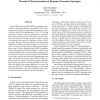Free Online Productivity Tools
i2Speak
i2Symbol
i2OCR
iTex2Img
iWeb2Print
iWeb2Shot
i2Type
iPdf2Split
iPdf2Merge
i2Bopomofo
i2Arabic
i2Style
i2Image
i2PDF
iLatex2Rtf
Sci2ools
120
click to vote
TIME
2009
IEEE
2009
IEEE
Fixing the Semantics for Dynamic Controllability and Providing a More Practical Characterization of Dynamic Execution Strategies
Morris, Muscettola and Vidal (MMV) presented an algorithm for checking the dynamic controllability (DC) of temporal networks in which certain temporal durations are beyond the control of the planning agent. Their DC-checking algorithm is based on rules for inferring new constraints based on the real-time context within which execution decisions must be made. This paper presents a counter-example to demonstrate that some of the inference rules are, in fact, not sound. The paper fixes the problem by strengthening the definition of dynamic execution strategies to correctly capture the central prohibition against advance knowledge of future events. The new definition enables MMV’s soundness proof to go through with minimal changes. It then uses the stronger definition to derive an equivalent, alternative characterization of dynamic execution strategies that highlights the real-time execution decisions that a planning agent must make. The procedural strategy used by MMV in their comp...
DC-checking Algorithm | Dynamic Execution Strategies | Execution Decisions | Logical Reasoning | TIME 2009 |
| Added | 21 May 2010 |
| Updated | 21 May 2010 |
| Type | Conference |
| Year | 2009 |
| Where | TIME |
| Authors | Luke Hunsberger |
Comments (0)

